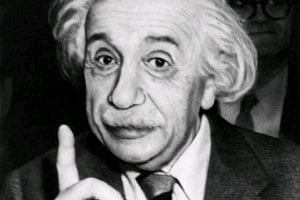Einstein’s General Relativity theory holds true a century later: Here’s why
If CERN discovers a particle that has a speed greater than that of light, General theory of Relativity will fail.

Just few hours back Jeff Bezos’ spaceflight company Blue Origin landed its reusable rocket back at its launch site. It couldn’t have come at a time, just when Einstein’s General Theory of Relativity turns 100 years old.
What is General Theory of Relativity?
monthly limit of free stories.
with an Express account.
General Theory of Relativity or General Relativity defines a geometric theory for gravitation, the first force to be understood scientifically.
Albert Einstein published general relativity in 1915 and proposed light to be at the centre of space and time. But to better understand General Relativity, we need to go back to 1665 and understand Newtonian physics.
In 1665, Newton proposed, sitting under an apple tree, that ‘the force keeping moon in orbit around earth and the one pulling the apple down is one and the same and called it gravity.’ Eminent Astrophysicist Stephen Hawking calls the story of Newton being inspired by an Apple hitting his head as apocryphal. But gravity is very much true – it is the force that is keeping us grounded.
There was nothing absurd about Newton’s prediction. His formula for Force being equal to mass of an object multiplied by acceleration (F=ma) is still very much in use. Our physics classes start with this formula is a fitting tribute to the man himself.
But how does gravity work?
This was the question Newton left unanswered and it took well over 250 years for a clerk to change the equation – rather we can say answer the equation in a better way. Einstein proposed that light is an entity that has maximum velocity in the universe equated to 3x 10^8 m/s.
In simpler terms, when an object moves at a speed equal to that of light, Newtonian physics fails.
While Special Relativity relates mass to energy (E=mc^2), General Relativity equates increased mass to increased velocity. With space being three dimensional and time being in single dimension, Einstein said the observer is also in dynamic motion. This new picture of force of gravity being a curvature of space-time is called General Theory of Relativity.
Does it still hold true?
Yes. General Relativity still very much holds true. In order to gain weight, it would be wise enough to run at a speed equal to that of light rather than taking vitamins. According to General Relativity, as one would run at a speed equal to light, the mass will increase automatically.
If CERN discovers a particle that has a speed greater than that of light, General theory of Relativity will fail.